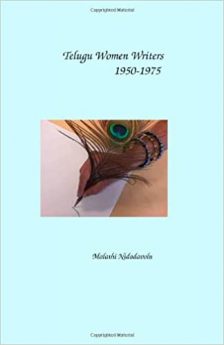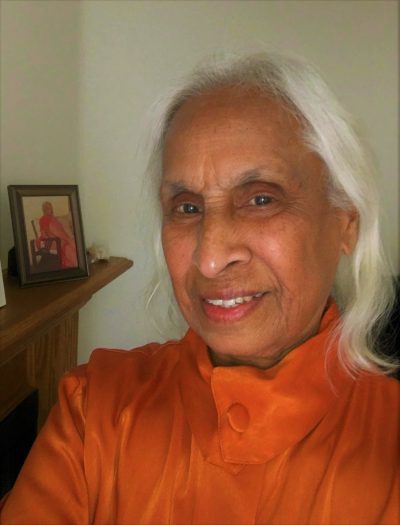
Telugu Women writers-12
-Nidadvolu Malathi
Andhra Pradesh Sahitya Akademi
The state government formed Sahitya Akademi [a literary organization] in 1957. One of the functions of Akademi was announcing awards annually to the best works in several categories.
In 1976, the Akademi announced awards for works in various literary genres as usual but excluded fiction from the list of categories. Puranam Subrahmanya Sarma, editor of Andhra Jyoti, took exception to their decision, and published a letter in his magazine condemning their action. The letter read as follows [translation mine]:
“On October 31, Andhra Pradesh Sahitya Akademi published several categories for awards but left out the fiction category. The novels that had received the award in the past may not be of inferior quality. However, the novels that are being published now are not substandard either, compared to the novels that had received the awards in the past.
For instance, Madireddy Sulochana has written excellent fiction depicting Telangana life. Among the titles worth mentioning are Tharam Marindi [new generation], Poola Manasulu [Flower-like hearts], and Mathamu Manishi [Religion and Man]. So also the novels of Sulochana Rani, Andhra people’s favorite writer. Her novels include Jeevana Tarangalu [The Waves Of Life], Bandi [Prisoner], and Premalekhalu [Love Letters] among others. Any one of these novels is sure to meet the criteria for an award. Several women writers such as, D. Kameswari, Parimala Someswar, and I.V.S. Achyuta Valli has written several excellent novels. Publishers have published a record number of three hundred new novels, which is unheard of in the history of Telugu fiction.
The descriptions Subrahmanya Sastry used while mentioning these writers are noteworthy. In the following year he expressed a view contradictory to these descriptive epithets.
A few years later, I happened to speak with Subrahmanya Sarma and ask him about his views on the subject. I asked him if his comments in the letter quoted above reflected his views on the fiction by women writers. He replied that he was speaking in relative terms; that is, in terms of the quality of the novels that had received awards in the past. His response however would not explain why he quoted novels written by women writers only.
I am not sure whether Sahitya Akademi had acted on this protest or not but the letter triggered a different kind of debate. The readers and the elite poured letters into the Andhra Jyothi office commenting on the fiction by women writers. Some readers wrote in support of the women writers and others seized the occasion to ridicule them. Some letters stated that the women writers were writing trash containing cheap sentiment and empty dreams while others maintained that the women writers were doing impressive service. In this heated debate, the comments made by two highly reputed male critics, Kodavatiganti Kutumba Rao and Addepalli Rammohan Rao were significant. Kutumba Rao stated that the writings should not be judged based on the writer’s gender. Rammohan Rao stated that the critics must give credit to the women writers for what they had accomplished thus far.
While I was discussing these letters with Kalpana Rentala, well-known feminist writer, she pointed out another article written by the same Subrahmanya Sarma published two years earlier. In his article, Subrahmanya Sarma made acerbic comments on fiction by women writers. As quoted by Kalpana Rentala in her foreword to this book, Subrahmanya Sastry commented that,
Many women writers were able to depict a woman’s life to the extent it was correlated to a man’s life. However, one can see from their writings that women knew absolutely nothing about the man’s world. There is no brainpower. They are hopelessly poor in their command of language. They do not read at all. They are lifeless cutouts submerged in self-aggrandizement, slandering others, and ego trips. This confounding state, which the women had created, pulled down the level of Telugu readers, and turned the clock back to fifty-years. (Telugu Katha: Vimarsanaatmaka Vyaasa Samputi. [Telugu Story: A Collection Of Analytical Essays.]).
Another writer, a University professor and critic of high repute, Kethu Viswanatha Reddy, commented,
Writers such as Sridevi, Saraladevi, Turaga Janakirani, Kalyanasundari Jagannath, Vasireddy Sitadevi, Acanta Saradadevi, Pavani Nirmala Prabhavati, Nidadavolu Malathi, and Ranganayakamma, have accomplished nothing in terms of technique, nothing comparable to Katherine Mansfield. What’s worse, they do not even have the ease of diction.
It is sad if not unconscionable for prominent literary scholars to stake their reputation and express disparaging comments, often contradicting themselves, against women writers in the seventies through nineties.
Andhra Pradesh Sahitya Akademy began organizing Telugu women writers from them. Conferences since 1963. I came across newspaper accounts of two conferences, one held in 1969 and the other in 1975. The two accounts illustrate the marked change in the tone and perceptions of the women writers from late sixties to mid-seventies.
The notable feature in the Conference held in 1969 was most of the writers—Dronamraju Lakshmibayamma, Avula Jayapradadevi, Yellapragada Sitakumari, Illandala Saraswatidevi and Utukuri Lakshmikantamma—were not only distinguished writers but also active participants in the Freedom Movement, and for that reason, the nationalist spirit seemed to be the dominant theme in their speeches.
They quoted Gandhian principles and his contribution to women’s movement: Recalled Gandhi’s advice to stay on the course of one’s duty and the rights would follow (Yellapragada Sitakumari). Gandhi was a pioneer, who put the individual ahead of the country and the society. It would take a long time before we saw the kind of country he had envisioned (Utukuri Lakshmikantamma). Men like Raja Rammohan Roy, Kandukuri Veeresalingam and Gandhi had done great service to women’s freedom (Illindala Saraswatidevi). We should worship Gandhi and Kasturi Baa the same way we worship our Gods (Dronamraju Lakshmibayamma).
On the third day, twenty-four women were honored. They were Illindala Saraswatidevi, Avula Jayapradadevi, Vidyavati Omprakash, Dronamraju Lakshmibayamma, Yellapragada Sitakumari, Basavaraju Rajyalakshmamma, Utukuri Laksmikantamma, Nayani Krishnakumari, Vasireddy Sitadevi, Binadevi, Nidadavolu Malathi, Vedula Minakshidevi, Polapragada Rajyalakshmi, Ramalakshmi Arudra, Sarvani, Darbha Bhaskaramma, Parimala Someswar, J. Varalaksmi, Tayaramma, Atluri Chaudhurani, Goparaju Hymavati, Surapaneni Manorama, and Maddi Ranganayakamma.
About the Conference held in 1975, Vasireddy Kasiratnam wrote a three-page review on the three-day meetings, the gist of which was as follows:
Majority of the readers wondered whether the Conference would be a success or failure. On a positive note, all the participants arrived on time to the meetings (which are rare in Indian context), and they all were well-prepared with their speeches.
Among the honorees, Bhanumati Ramakrishna was a renowned actress. Hence there was a question whether the audience came to see only her. The Chairman, Bezawada Gopala Reddy, governor of Uttar Pradesh, suggested that those who had come to see the movie star only were free to leave along with the actor. The audience however remained seated, proving that the writers commanded the same glamour as the movie stars.
The comments made by speakers reflected contemporary views on and by women writers: Women writers may seem to be lagging behind but that is unfounded (Vasireddy Sitadevi). Women writers should learn to study life critically, understand human nature and write responsibly (Vasireddy Kasiratnam). Movie producers prefer women’s stories; women writers should not give critics a reason to accuse them of plagiarism (Bhanumati Ramakrishna). Nowadays we see numerous female names in the field of fiction but sixty percent of them are male writers writing under female pseudonyms; good fiction comes out of good criticism (Ramalakshmi Arudra). Current literature is reflecting the changes that had taken place in the past twenty-five years (Parimala Someswar). Today’s society is filled with numerous issues, and writers should write about those issues in a constructive manner (Syamala Rani). A story has done its job if it could change just one person (Kavilipati Vijayalakshmi).
These statements show that women writers were becoming increasingly aware of the social conditions around them and their role as writers in the society.
*****
(Contd..)

Nidadavolu Malathi born in 1937 to progressive parents, Nidadavolu Jagannatha Rao garu and Seshamma garu. She has Masters’ degrees in English Language and Literature, and in Library and Information Sciences. She has been writing fiction in Telugu since early 1950’s.
She moved to America in 1973. In 2001, she created a website, www.thulika.net, with a goal to introduce Telugu culture and customs through translations of stories and original essays on various topics. She has translated over 100 stories and wrote several critical essays. The website has been a good source for researchers in several universities abroad. In 2009, she started her blog, Telugu Thulika (www.tethulika.wordpress.com) where she has been publishing her Telugu stories, essays and poetry.
Her translations have been published in 2 anthogies, From my Front Porch (Sahitya Academy), and Penscape (Lekhini, Hyderabad). Her short stories in Telugu are published in 2 anthologies, Nijaanikee Feminijaanikee Madhya (BSR Publications) and Kathala Attayya garu (Visalandhra). She also has published eBooks: Eminent Telugu Scholars and other Essays (Non-fiction), All I Want Was to Read, My Litttle Friend (Short Stories.)
